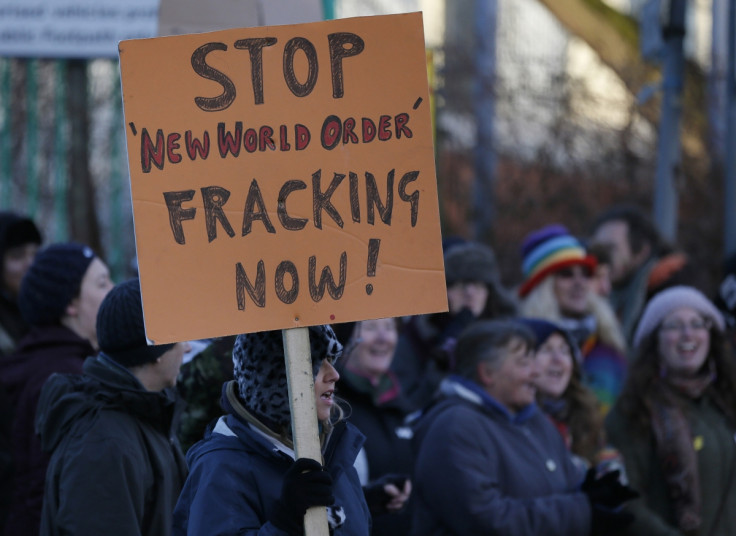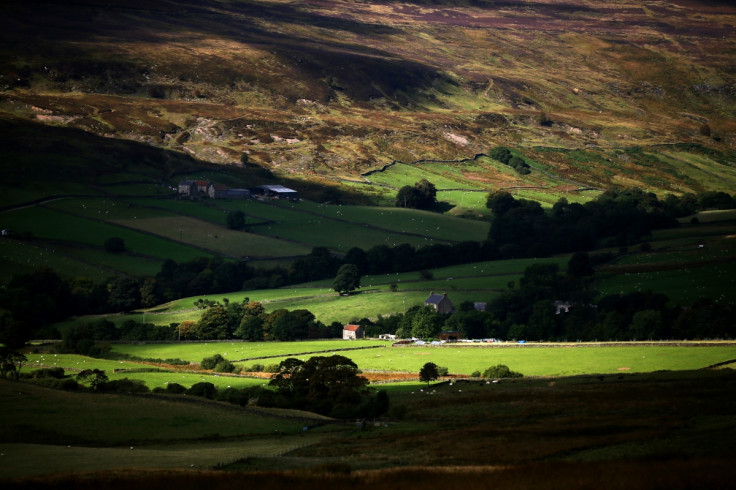Why Britain Needs to Get Fracking to Shirk Off Russia's Grip on Gas

The debate over whether Britain should get fracking, by tapping into a wealth of shale gas deep underneath the country's soil, has taken another turn after the Centre for Policy Studies released a strong message that we should ramp up development very soon.
According to an analyst note, written by CPS' Adam Memon, Angeliki Terpou and Tim Knox, the thinktank warned that Britain will never be able to loosen Russia's tight grip over the country's energy supplies if the UK doesn't take matters into its own hands and start developing its shale gas industry.
So what is shale gas? I hear you say.
Shale gas is extracted by hydraulic fracturing- dubbed fracking- and has already transformed the US energy market by lowering gas and coal prices.
Fracking involves drilling holes deep into the ground and then using high-pressure liquid to fracture shale rocks to release gas trapped inside.
While the International Energy Agency (IEA) has lauded shale gas as the reason for the US' 'Golden Age' of gas and a 'game changer' to the world supply picture, Britain is still far behind its cousins across the pond in terms of tapping into the lucrative resource.
"Renewed concerns over European energy dependency on Russia means the question of energy security is high on the list of priorities at the G7 in Brussels," said the CPS trio.
"Energy security should be measured according to the diversity of sources of supply and dependence on imports from volatile countries. The free trade of energy is of course desirable but it is also clear the health of European economies is vulnerable to disruptions in energy supplies caused by geopolitical disturbances."
"Increasing the security of energy supplies is therefore important to the UK's economic well-being."
Britain's Dependency on Imports
A British Geological Survey study has also confirmed that there are 1,300 trillion cubic feet of shale gas reserves lying under Yorkshire and Lancashire.
However, environmentalists have criticised the effect the method would have on the surrounding areas and possibly on the health of the local inhabitants, and have ceremoniously disrupted developments over the past year or so.
For example, last summer, Cuadrilla bowed down to pressure and scaled back its exploratory drilling work at the Balcombe site in Sussex after police warnings of potential civil disobedience ahead of several days' protesting by a thousand anti-fracking campaigners.
Amid the environmental debate, the CPS warned that Britain's dwindling energy production has to be abated by one of the country's most promised new energy fields – shale gas.
According to the Department of Energy and Climate Change (DECC), the UK's total energy production fell by 6.5% from 2012 mainly due to falls in the production of oil, coal and natural gas.
Furthermore, the "UK's net energy import dependency climbed to 47%, the highest level since 1975, and energy exports reached their lowest level since 1980."
"Given the fall in domestic energy production, the rise in the UK's energy import dependence and our particular reliance on Russia for coal imports, it is vital we find ways to secure our supplies of energy," added the CPS.
Telling Environmentalists to Frack Off
The CPS also addressed the issue of increasingly vocal environmentalists, despite the British government's health agency, and others, revealed that the risks to public health from exposure to fracking emissions are low.
And according to Water UK, Britain's developing shale gas industry will not put undue pressure on water supplies and environmental risks will be minimised.

Earlier this year, the group signed a Memorandum of Understanding (MoU) with the United Kingdom Onshore Operators Group (UKOOG), so members will cooperate throughout the shale gas exploration and extraction process and minimise any risks to the environment.
In addition, the analysts also said that its report, entitled Why Every Serious Environmentalist Should Favour Fracking, that "the extraction of shale gas can be used to help fight against the terrible particle pollution (PM)2.5 air pollutant [which is associated with cancer] from which more than 3 million people die a year."
"As Tony Lodge, argues, recent announcements that companies such as Total and Centrica are investing in British shale exploration are a significant confidence boost to an industry facing severe opposition from a number of vested interests."
So where does the UK go from here?
The CPS recommend that the government does what it can to iron details over regulation, taxation and property issue concerns, in order to unlock the market. It also warns that the political football, over energy price fixing pledges, is distracting the country from developing a competitive shale gas industry.
"The development of new energy supplies in the UK is decreasingly related to what happens below the ground and increasingly influenced by the regulatory framework, fiscal regime and technological developments above the ground," said Memon, Terpou, and Knox.
"Setting an energy policy which chases oil price rises or which tries to freeze consumer prices would certainly discourage investment in the UK's oil and gas industry.
"The existing fiscal regime is complex and burdensome and whilst some steps have been taken to reduce this, more can be done. Whilst we should be aware of legitimate concerns over property rights, it is important for the government to allow a real market in fracking for shale gas to develop both for environmental reasons and for our long term energy security."
© Copyright IBTimes 2025. All rights reserved.




















